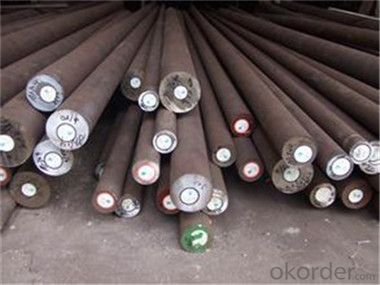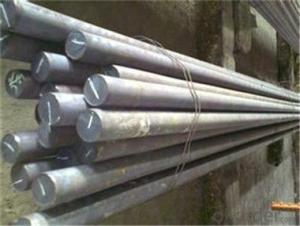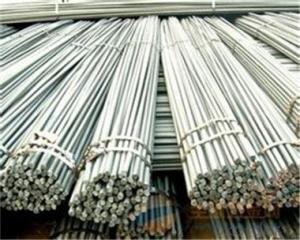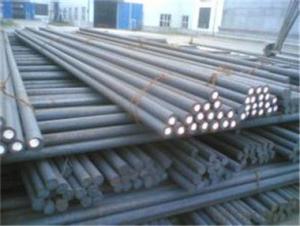Free Cutting Steel Round Bar with Good Quality in China
- Loading Port:
- Tianjin
- Payment Terms:
- TT OR LC
- Min Order Qty:
- 700 m.t.
- Supply Capability:
- 2000000 m.t./month
OKorder Service Pledge
OKorder Financial Service
You Might Also Like
Description of steel round bar:
Is used mainly for force for small size and finish requirement strict instruments and meters, watch parts, automobile, machine tool and other kinds of machines used, strict with dimension precision and smooth finish.
Festures of steel round bar:
4340 Forged Round Steel Bar
1.Dia 80-800mm Length:2000-13000mm or as required
2.Technique:Forged
3.Delivery Time:45 days
Specifications of steel round bar:
Description |
Carbon Steel Rod/Carbon Steel Bar,carbon steel rod,carbon steel shaft,mild steel bar, mild steel shaft,ms bar | |
Material | ASTM | 1005,1006,1008,1010,1015,1020,1025,1030,1035,1040,1045,1050,1055,1060,1065,1070,1080,1084, 1016,1022 |
DIN | Ck10,Ck15,Ck22,Ck25,Ck30,Ck35,Ck40,Ck45,Ck50, 30Mn4,40Mn4 | |
BS | 040A04,095M15,045M10,080A40,045M10,080M50 | |
Standard | GB/T799,ASTM A29,A108,A321,A575,BS970,DIN1652,JIS G4051 | |
Section shape |
Round | |
Length |
As your required | |
Application | Carbon steel rod applies to chemical industry, shipping industry, manufacturing industry,construction,decorate Industry,electric power, pump shafts, sanitary wares,furniture handles,boiler,high temperature resistant,low temperature resistant, corrosion resistant. | |
Images of steel round bar:

FAQ:
1. What is your package?
Packing situation: standard seaworthy packing or as customer required.
2. How long is the lead time?
Delivery time: 45 days after order confirmed.
3. What payment term do you accept?
Payment: T/T or L/C at sight.
- Q:What is the difference between 40Cr round steel and 40Cr steel forgings?
- Generally speaking the 40Cr steel is a kind of hot rolled steel (rarely cold). The need for heating the material before hot rolling process is or rolled, usually heated to above the recrystallization temperature, then condensation formed after the bar, of course I say is very simple, there are many steps.
- Q:Can steel round bars be used in the construction of buildings?
- Yes, steel round bars can be used in the construction of buildings. Steel round bars are commonly used as reinforcement in concrete structures, such as columns, beams, and slabs. They provide additional strength and stability to the building, making it more resistant to structural loads and forces. The round shape of the bars allows for easy bending and shaping, making them versatile and suitable for various construction applications. Additionally, steel round bars are known for their high tensile strength, durability, and corrosion resistance, making them an ideal choice for long-lasting and reliable building construction.
- Q:How are steel round bars used in the construction of dams and reservoirs?
- Due to their strength, durability, and versatility, steel round bars are essential components in the construction of dams and reservoirs. These bars, typically made of reinforced steel, play a vital role in reinforcing the concrete structures that make up dams and reservoirs. In dam construction, steel round bars are primarily used as reinforcement in concrete walls and foundations. Strategically placed within the concrete, these bars provide additional tensile strength, preventing cracking and ensuring the structural integrity of the dam. By withstanding the enormous pressure exerted by the water, the reinforcement helps prevent leaks or potential failures. Furthermore, steel round bars are utilized to strengthen the spillway gates and control structures of dams and reservoirs. These gates regulate the flow of water and prevent overflow during heavy rains or floods. By reinforcing these critical areas with steel round bars, engineers guarantee that the gates can endure the forces exerted by the flowing water, maintaining their functionality and preventing potential damage. In addition, steel round bars are used in the construction of penstocks, which are large pipes or conduits that transport water from reservoirs to turbines in hydroelectric power plants. These bars reinforce the penstocks, ensuring they can withstand the high pressure of the water as it flows through and powers the turbines. In conclusion, steel round bars are extensively applied in dam and reservoir construction to enhance the strength and durability of various structural components. Their ability to reinforce concrete walls, foundations, spillway gates, control structures, and penstocks makes them indispensable in ensuring the longevity and stability of these crucial water infrastructures.
- Q:What are the different types of steel round bar surface finishes for improved cleanliness?
- Different surface finishes can be used on steel round bars to enhance cleanliness. Here are some examples: 1. Achieving a bright surface finish involves polishing the steel round bar, resulting in a smooth and reflective appearance. This type of finish is commonly utilized in industries where cleanliness and aesthetics are crucial, such as the manufacturing of kitchen appliances or decorative items. 2. A satin finish can be achieved by brushing the steel round bar with fine abrasive pads, resulting in a smooth and matte surface. This finish is often preferred in applications that require a clean and modern look, like architectural designs or furniture manufacturing. 3. The pickled finish involves immersing the steel round bar in an acid solution, which eliminates impurities and oxides from the surface. This type of finish is commonly used in applications where the steel round bar will undergo further processing, such as the production of pipes or tubes. 4. To obtain a passivated finish, the steel round bar is treated with a chemical solution that forms a protective oxide layer on the surface. Passivated finishes enhance the steel's corrosion resistance, making it suitable for use in harsh or corrosive environments. 5. The shot blasted finish involves propelling small metal or ceramic particles at high velocity onto the surface of the steel round bar. This process removes scale, rust, or surface contaminants, resulting in a clean and textured surface. Shot blasted finishes are often employed when a strong bond between the steel round bar and another material, such as paint or coating, is required. Ultimately, the choice of surface finish for steel round bars depends on the specific application and the desired level of cleanliness. Each finish offers distinct properties and advantages, allowing for improved cleanliness and performance in various industries.
- Q:What are the advantages of using nickel-chromium-manganese alloy steel round bars?
- Nickel-chromium-manganese alloy steel round bars offer numerous benefits in various applications. Firstly, this type of alloy steel provides exceptional strength and durability. The combination of nickel, chromium, and manganese enhances the overall strength of the steel, making it resistant to wear, impact, and deformation. This is particularly advantageous in industries such as construction, manufacturing, and automotive, where the round bars are commonly used for structural support and load-bearing purposes. Secondly, the round bars made from nickel-chromium-manganese alloy steel exhibit outstanding corrosion resistance. The presence of nickel and chromium in the alloy composition results in high resistance to rust and oxidation, even in harsh environments or exposure to corrosive substances. This property is crucial in applications where the round bars are exposed to moisture, chemicals, or high temperatures, such as marine environments or chemical processing plants. Additionally, this type of alloy steel offers excellent weldability and machinability. The balanced composition of nickel, chromium, and manganese enables easy welding and machining operations. This convenience allows fabricators and manufacturers to work with the round bars, creating complex shapes or structures without compromising the material's integrity. Moreover, nickel-chromium-manganese alloy steel round bars possess exceptional heat resistance. The presence of nickel and chromium in the alloy composition enhances its ability to withstand high temperatures without losing strength or shape. This property makes it suitable for applications involving exposure to extreme heat, such as furnace components, heat exchangers, or high-temperature industrial processes. Lastly, the use of nickel-chromium-manganese alloy steel round bars often leads to long-term cost savings. Due to their remarkable strength and durability, these round bars have a longer lifespan compared to other materials. This reduces the need for frequent replacements, resulting in lower maintenance costs and improved overall efficiency. In conclusion, the advantages of nickel-chromium-manganese alloy steel round bars include remarkable strength and durability, corrosion resistance, weldability, machinability, heat resistance, and long-term cost savings. These properties make them a preferred choice in various industries that require high-performance materials.
- Q:Can steel round bars be used in the packaging industry?
- Yes, steel round bars can be used in the packaging industry. They are commonly used for constructing pallets, crates, and other packaging materials that require strength, durability, and load-bearing capacity. Steel round bars provide a robust and reliable solution for packaging heavy and bulky items, ensuring safe transportation and storage.
- Q:Can steel round bars be used in the production of agricultural equipment?
- Yes, steel round bars can be used in the production of agricultural equipment. Steel round bars are known for their strength, durability, and versatility, making them suitable for various applications, including agricultural equipment manufacturing. They can be used for constructing frames, supports, axles, and other components that require high strength and resistance to wear and tear.
- Q:What are the advantages of using maraging steel round bars?
- There are several advantages of using maraging steel round bars in various applications. 1. High strength: Maraging steel round bars have an exceptionally high strength-to-weight ratio, making them ideal for applications where strength is crucial. These bars can withstand high stress and load-bearing conditions without deformation or failure, ensuring structural integrity. 2. Superior toughness: Maraging steel round bars exhibit excellent toughness, which means they can absorb a significant amount of energy before fracturing. This property makes them highly resistant to cracking or breaking, even under extreme conditions, enhancing their durability and reliability. 3. Corrosion resistance: Maraging steel round bars are known for their exceptional corrosion resistance. They are less susceptible to rust and oxidation compared to other types of steel, making them suitable for applications in harsh environments or where exposure to moisture or chemicals is a concern. This corrosion resistance helps prolong the lifespan of the bars and reduces maintenance costs. 4. Machinability: Maraging steel round bars are relatively easy to machine, despite their high strength and hardness. They can be readily shaped, drilled, and cut into various forms and sizes, allowing for versatile applications across different industries. This ease of machining saves time and effort during the manufacturing process. 5. Heat treatability: Maraging steel round bars have excellent heat treatability, meaning they can be hardened and tempered to further improve their mechanical properties. This flexibility in heat treatment allows for customization to meet specific project requirements, such as achieving desired hardness levels or enhancing specific characteristics like wear resistance or toughness. 6. Aerospace and defense applications: Maraging steel round bars are widely used in aerospace and defense industries due to their exceptional strength, toughness, and corrosion resistance. They are commonly employed in the manufacturing of critical components like landing gear, missile casings, and aircraft structures, where reliability and performance are of utmost importance. Overall, the advantages of using maraging steel round bars include their high strength, superior toughness, corrosion resistance, machinability, heat treatability, and suitability for aerospace and defense applications. These properties make them a preferred choice for various demanding industries and ensure optimal performance and longevity in critical applications.
- Q:How is the weight of a steel round bar calculated?
- The weight of a steel round bar is calculated using the formula: weight = volume × density. The volume of a round bar is determined by multiplying the cross-sectional area (πr^2) with the length of the bar. The density of steel is usually known, so by plugging in these values, we can calculate the weight of the steel round bar.
- Q:How do steel round bars compare to fiberglass or composite bars?
- Steel round bars and fiberglass or composite bars have distinct differences in terms of their properties and applications. Strength and Durability: Steel round bars are known for their exceptional strength and durability. They have a high tensile strength and can withstand heavy loads and stress. Fiberglass or composite bars, on the other hand, have good strength-to-weight ratio but are generally not as strong as steel bars. They may be more prone to bending or breaking under high pressure or impact. Weight: Steel bars are significantly heavier than fiberglass or composite bars. This can be advantageous in certain applications where additional weight is desired for stability or to counteract external forces. However, in situations where weight reduction is crucial, such as in aerospace or automotive industries, fiberglass or composite bars are preferred due to their lightweight nature. Corrosion Resistance: Steel bars are susceptible to corrosion, especially when exposed to moisture or harsh environments. They require regular maintenance and protective coatings to prevent rusting. In contrast, fiberglass or composite bars are inherently corrosion-resistant, making them suitable for applications in marine or chemical industries where exposure to corrosive elements is common. Electrical Conductivity: Steel round bars are conductive, which can be advantageous in certain applications where electrical grounding or conductivity is required. Fiberglass or composite bars, being non-conductive, are preferred in situations where electrical insulation is necessary, such as in electrical installations or sensitive electronic systems. Cost: Steel bars are generally more cost-effective compared to fiberglass or composite bars. The raw materials for steel production are widely available, making them more affordable in most cases. Fiberglass or composite bars, on the other hand, involve complex manufacturing processes and the use of specialized materials, leading to higher production costs. In summary, steel round bars are favored for their strength, durability, and cost-effectiveness. They are commonly used in construction, manufacturing, and infrastructure projects. Fiberglass or composite bars, on the other hand, offer advantages in terms of weight reduction, corrosion resistance, electrical insulation, and are frequently used in applications requiring these properties. The choice between the two depends on the specific requirements and conditions of the project or industry.
1. Manufacturer Overview |
|
|---|---|
| Location | |
| Year Established | |
| Annual Output Value | |
| Main Markets | |
| Company Certifications | |
2. Manufacturer Certificates |
|
|---|---|
| a) Certification Name | |
| Range | |
| Reference | |
| Validity Period | |
3. Manufacturer Capability |
|
|---|---|
| a)Trade Capacity | |
| Nearest Port | |
| Export Percentage | |
| No.of Employees in Trade Department | |
| Language Spoken: | |
| b)Factory Information | |
| Factory Size: | |
| No. of Production Lines | |
| Contract Manufacturing | |
| Product Price Range | |
Send your message to us
Free Cutting Steel Round Bar with Good Quality in China
- Loading Port:
- Tianjin
- Payment Terms:
- TT OR LC
- Min Order Qty:
- 700 m.t.
- Supply Capability:
- 2000000 m.t./month
OKorder Service Pledge
OKorder Financial Service
Similar products
New products
Hot products
Hot Searches
Related keywords































